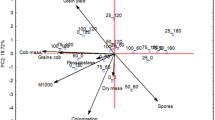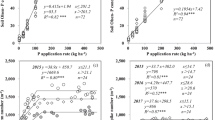Abstract
A PRELIMINARY investigation of the effect of the nitrogen supply on the growth of Agropyron repens L. Beauv. showed that reducing the nitrogen level caused an increase in the number of rhizomes produced. This increase in rhizome production was associated with a marked suppression of tillering and seemed to have resulted from a tendency for buds to develop as rhizomes rather than as tillers at the lower nitrogen-levels. A further experiment was therefore designed to investigate this effect more critically.
This is a preview of subscription content, access via your institution
Access options
Subscribe to this journal
Receive 51 print issues and online access
$199.00 per year
only $3.90 per issue
Buy this article
- Purchase on Springer Link
- Instant access to full article PDF
Prices may be subject to local taxes which are calculated during checkout
Similar content being viewed by others
References
Hoagland, D. R., and Arnon, D. I., Circ. Calif. Agric. Expt. Sta., 347 (1939).
Palmer, J. H., Nature, 174, 84 (1954).
Author information
Authors and Affiliations
Rights and permissions
About this article
Cite this article
McINTYRE, G. Influence of Nitrogen Nutrition on Bud and Rhizome Development in Agropyron repens L. Beauv.. Nature 203, 1084–1085 (1964). https://doi.org/10.1038/2031084a0
Issue Date:
DOI: https://doi.org/10.1038/2031084a0
This article is cited by
Comments
By submitting a comment you agree to abide by our Terms and Community Guidelines. If you find something abusive or that does not comply with our terms or guidelines please flag it as inappropriate.



